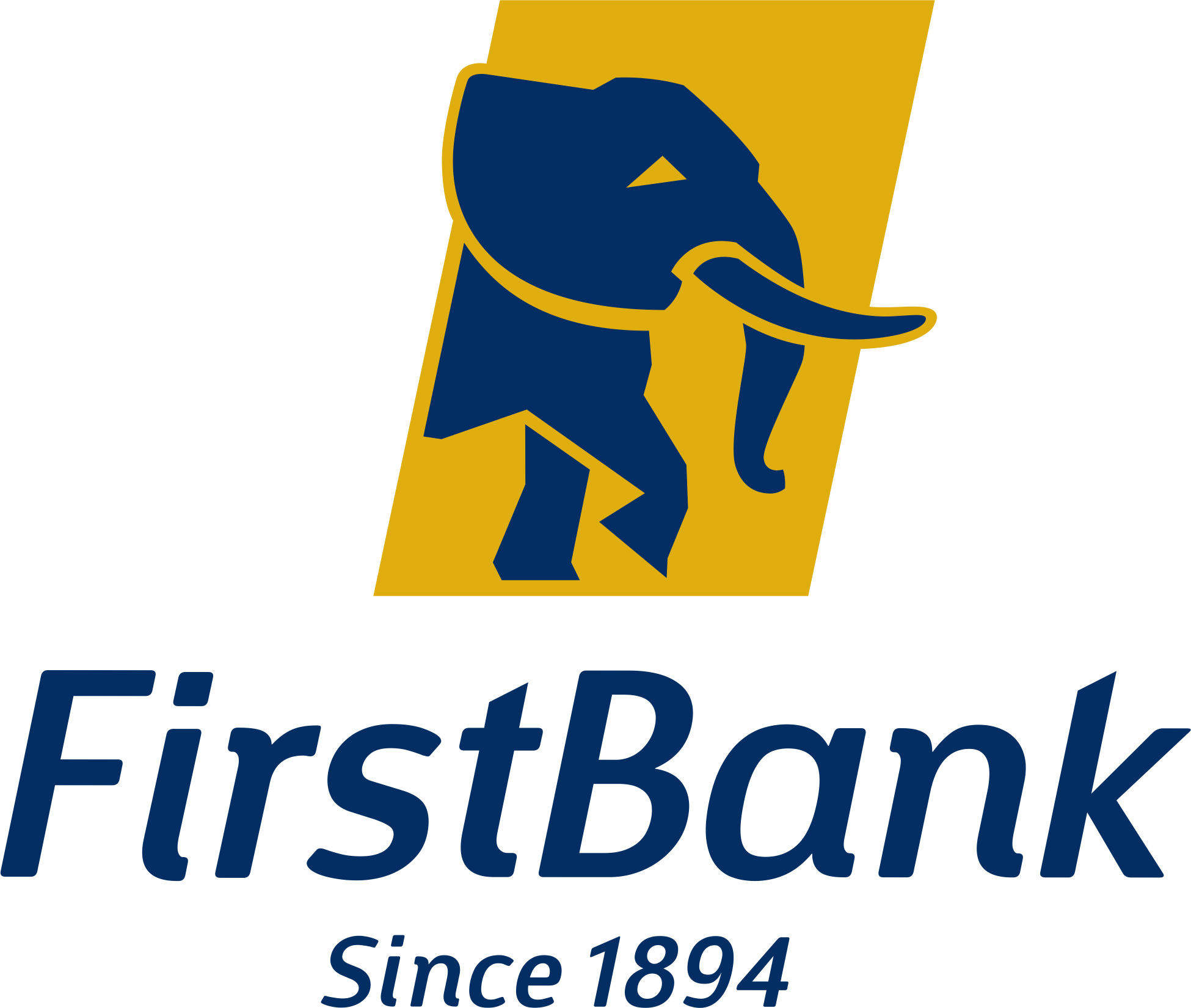Business
FirstBank Cardholders Records N1.18trn in Transactions Value during Lockdown
Published
4 years agoon

Since its establishment in 1894, FirstBank has consistently built relationships with her customers, focusing on the fundamentals of good corporate governance, strong liquidity, optimised risk management and effective leadership. These, amongst others, are the reasons the Bank has dominated the financial market for over 126 years.
The Bank has led the financing of private investment in infrastructural development in the Nigerian economy by playing key roles in the Federal Government’s privatisation and commercialization schemes, and entrenchment of the cashless policy which gave rise to electronic cards being a veritable entity in the day to day transactions among the bank’s customers. Consequently, the use of its wide range of cards, developed with the ‘man on the move’ in mind, come with far reaching benefits and rewards, connecting the remotest of places even as the world is plagued by the novel Corona virus disease today.
The world as we know it today, is a global village, and its connectivity is at the tip of an individual’s finger. That aside, it also revolves around the use of ‘ordinary’ but highly customised cards and FirstBank is a confirmed Leader in this space. There’s no gainsaying the fact that for 126 years and counting, FirstBank, Nigeria’s premier bank, with accolades and awards trailing its existence, has continued to blaze the trail in certainly every financial innovation. And as the name signifies, has continued to be the first in virtually everything banking and finance. Little wonder that in December 2015 and May 2016, FirstBank was named the first financial institution in the country to achieve sustained alternative channels transaction volumes of 100 million transactions. Subsequently in 2017, the Bank also attained the Milestone of 10million card base, a feat that is first of its kind in West Africa and Second in Africa.
There is hardly any banking innovation, which is not traced to the company that has overtime woven itself into the very fabric of the society. Commenting on FirstBank’s strides, the Chief Executive Officer, Dr. Adesola Adeduntan, disclosed that the bank’s 53, 000 agents across the country processed about N512 billion worth of transactions with differing values while the lockdown lasted. He noted that the bank was “able to actively support her customers, their families and businesses through these challenging times.” This is nothing short of the FirstBank advantage.
Adeduntan reiterated the faith Nigerians have in the use of FirstBank cards, saying that during the period of the lockdown, Nigerians with FirstBank cards used them 105 million times to make payments or withdrawals worth about N1.18 Trillion as they relied on the Bank to settle their banking needs. In addition, the Bank’s CEO noted that approximately 12.6 million withdrawals to the tune of N156 billion were carried out across FirstBank’s ATMs nationwide.
“Our customers made transfers over 106 million times with a total value of about N8.18 Trillion across our digital channels. We have also recorded over 275,000 new sign-ups to alternative channels covering our Firstmobile, USSD and First-Online platforms,” the CEO informed.
While calling on lovers of stress-free banking to get on board, the FirstBank CEO further assured existing customers of the bank’s relentless efforts to ensure that banking transactions continue seamlessly, adding that COVID-19 will not slow down her activities and efforts at staying true to her brand promise to her customers.
FirstBank cards come in a wide range of categories, each fulfilling tasks that are better imagined, but nevertheless are flexible and offer comfort, stress-free banking and wholesome peace of mind. It is therefore not a coincidence, that FirstBank is and remains Nigeria’s highest card transacting bank; a product of carefully thought out process, hard work and the quest to keep its customers first in all things. This is especially important at a time when movement and business activities were largely hampered by the lockdown, with the maintenance of social distance and the potential increase in the use of the Bank’s alternative channels – which is facilitated by its cards – for various transactions and business activities, thus staying safe to win the fight against the COVID-19 pandemic.
The range of cards available to customers of FirstBank are categorised into three broad groups, viz; DEBIT, CREDIT and PREPAID Cards. The grouping covers outstanding cards offerings such as Naira MasterCard, Verve Card and the pioneering Visa Multi-Currency Card. Others are Expressions MasterCard, Platinum MasterCard, Visa Infinite Credit Card, Visa Gold Credit Card, Naira Credit Cards (Visa Classic and Platinum), Visa Prepaid Card and Verve Prepaid Card.
FirstBank’s Naira MasterCard & Verve Card are Secured by Chip & PIN technology with local POS/Web limit increase available upon request. The Naira denominated MasterCard comes with various benefits such as online purchases, bills payments and cash withdrawals at ATMs world-wide. The various transaction limit(s) on Naira MasterCard issued by the Bank are N150,000 for ATM transactions, N2,500,000 for POS and N1,000,000 for Web transactions.
The FirstBank Verve Debit Card works with Chip and PIN technology to secure transactions. It allows the cardholder to conveniently pay for goods and services and is accepted by all ATMs, POS, Web, Mobile, Kiosk, and Bank Branch connected to the Interswitch network in Nigeria. It is available to all account holders and enables daily transaction limits of N150,000, and N500,000 on ATM and POS channels respectively. Customers can transact up to N1 million on the Web in a single transaction.
FirstBank cards also offer the Card Protection Transactions feature, which allows the cardholder to activate or deactivate it for all types of transactions, channels and locations, through the Card-in-Control Service on the Firstmobile app. The steps are few and simple: On the Firstmobile app, go to Self Service > Card Services and choose card type (Debit, Credit, or Prepaid) to be activated or deactivated.
Another card innovation service by FirstBank is the Visa Gold Card, which offers higher daily spending capacity and limit on ATM, POS and Web. With the Visa Gold Card, the customer is assured of $1,000 daily ATM withdrawal, $10,000 POS transaction and $5,000 on the Web at any location around the world. It is a dollar denominated international Premium Credit Card issued in partnership with Visa International.
Moreso, it guarantees access to international emergency services such as Emergency Card Replacement & Emergency Cash Advance in situations where the card gets lost or damaged. The Visa Gold card comes handy when making airline bookings with its smooth seamless purchase options.
Yet another, among the FirstBank’s super cards, is VISA Debit Multi-Currency Card. It is by all intent and purpose, the first of its kind to be offered by any financial institution in Nigeria. It is an enhancement to the existing Visa Debit Dual Currency card and can be linked to any or all NAIRA, USD, EURO and GBP accounts. It is an international card with Chip and PIN technology which can be used to make payment anywhere in the world and across all channels – ATMs, POS & Web. With the Visa Debit Multi-Currency card, cardholders can make daily withdrawals to the tune of N150,000 (local) and $1,000 (international) from the ATM. However, on the Web, a total of N1,000,000 is permitted locally while $6,250 is allowed on the international corridor daily. POS transaction limit is N2,500,000 (local) and $2,500 (international).
The Platinum Debit MasterCard is a premium Debit Card denominated in Naira. It is linked directly to a customer’s Naira denominated Current and/or Savings account. It offers a convenient alternative to the use of cash, and cheques by giving direct access to funds in cardholders’ accounts across all channels like ATM, POS, and WEB etc.
Like other card types, its transactions are easily monitored via the FirstBank FirstMobile App or FirstBank Internet Banking service and offers 24-hour access support for all card-related complaints through First Contact. It is a card linked to a Naira denominated account, and it is valid for three years.
It is designed to suit the lifestyle of senior and management executives of multinational companies and leaders across various industries and sector of the global economy. Its daily limits include; ATM: N300,000; POS: N3million; Web: N2,000,000 as well as Cross-border TXN limit: $500 monthly.
For a brand that has consistently remained on top of its game, FirstBank Cards have received global recognition, as well as multiple honour for its reliable and trusted services.
Speaking further, Adeduntan highlighted that the contactless capability of the bank’s Visa and MasterCards support less human-to-human contact in executing transactions, in the same way that the Debit Cards have remained the base channel for self-onboarding to any digital channel such as USSD, Firstmobile, FirstOnline etc. It is therefore, imperative that customers get a Debit Card because of its peculiar nature to get enrolled on FirstBank’s digital channel for the best of services.
FirstBank’s benevolence did not end with making cards available to customers, but has initiated value added services attached to the cards including ‘discount at Merchants location such as Jumia Friday, Health Plus, among others. These are, without an iota of doubt, exclusive to FirstBank cardholders. This is why you must get your card(s) if you are yet to. Email us at [email protected], or call your Relationship Manager/Private Banker for whatever card options you require.
No lockdown on FirstBank alternative channels. Sign up for FirstMobile, FirstOnline, *894# and FirstBank cards today! #EnablingYou |
Related
Sahara weekly online is published by First Sahara weekly international. contact [email protected]

Business
Lion Oshiyemi Pledges redefinition, reposition as he emerges 20th President of OGUNCCIMA
Published
6 hours agoon
July 26, 2024
Lion Oshiyemi Pledges redefinition, reposition as he emerges 20th President of OGUNCCIMA
Lion Niyi Oshiyemi has been invested as the 20th President of the Ogun State Chambers of Commerce, Industry, Mines and Agriculture (OGUNCCIMA) at the Chamber’s 40th Annual General Meeting.
The investiture ceremony of the new OGUNCCIMA leadership was held on Thursday at Tunwase Hall in Ijebu Ode, Ogun State with top Chamber movement members in attendance.
The President In his acceptance speech, expressed gratitude to the immediate past President, Engr. Mike Akingbade, and the Chamber for entrusting him with the esteemed position.
He pledged to leverage available opportunities to redefine and reposition the Chamber, creating platforms to influence legislation and improve the business environment.
“I am honored to lead this prestigious organization and I promise to harness all available opportunities to redefine and reposition the chamber of commerce movement in the state”.
“I will continue to create platforms to influence legislation and other measures affecting trade, improve the business environment, and build a Nigerian economy of thriving business opportunities through networking”.
“I wish to enjoin you all who represent businesses, if you have not joined the OGUNCCIMA, please come and lend your voice to others. The bigger the network, the louder the voice and the stronger the influence”.
“Our advocacy seeks to ensure that the business community can have its voice heard on issues that are important to it”.
“I’d like to introduce to you my Presidency’s flagship project “OGUNCCIMA Secretariat”: The project is massive and requires a lot, I therefore seek your support and look forward to partnering with all stakeholders – the state government and it’s agencies (Federal and State Ministries, Departments and Agencies), development partners, the diplomatic communities, the media, and other stakeholders”, he said.
Oshiyemi also praised the founding fathers of the Chamber, saying, “I laud the vision of our founding fathers, who have laid a solid foundation for us to build upon. I am committed to taking OGUNCCIMA to greater heights and making it a beacon of hope for businesses in Ogun State.”
The Ogun State Hon. Commissioner for Industry, Trade and Investment, Hon. Adebola Sofela Emmanuel, in his keynote address said by the Permanent Secretary, Ministry of Trade and Investment, Dr. Olu Ola Aikulola, said over the years that the Ogun State Chambers of Commerce, Industry, Mines and Agriculture (OGUNCCIMA), has not only remained a beacon of entrepreneurial excellence, but also partners in driving economic growth, fostering trade, and promoting investment opportunities in the state.
He said: “I would like to extend my heartfelt congratulations to OGUNCCIMA on this historical movement. Forty years of dedicated service to the industrial, trade, and agricultural sectors of Ogun State is no small feat”.
“Over the years, the Ogun State Chambers of Commerce, Industry, Mines and Agriculture (OGUNCCIMA) has not only been a beacon of entrepreneurial excellence but also a pivotal partner in driving industrial growth, fostering trade, and promoting investment opportunities”.
“Today, as we elect new officers to continue this legacy of excellence, I urge all members to approach this process with a spirit of unity, fairness, and foresight. The future of our chambers and the economic well-being of our state depend on the collective wisdom and strategic vision of our leaders”.
“For us, as a government, we will continue to put in place Institutional mechanisms that will guide our various developmental programmes in all sector of the economy”, he added.
In his remarks, NACCIMA President, Dele Kelvin Oye, represented by the Director – General, Olusola Obadimu, urged the new leadership of OGUNCCIMA to reflect on the the Chambers achievements and chart the course for the future.
“Today, as we gather for the 40th Annual General Meeting and Investiture of New Executives, I want to charge the new leadership to be dedicated and build on the achievements of the past administrations”.
“On behalf of NACCIMA, I congratulate the new officers and may our shared efforts continue to bear fruit, and may new officers lead us for greater heights of success and prosperity”, he concluded.
Related
Business
ASR AFRICA FLAGS OFF CONSTRUCTION OF A N280 MILLION INTEGRATED PUBLISHING HOUSE FOR BABCOCK UNIVERSITY, ILISHAN-REMO, OGUN STATE, NIGERIA
Published
10 hours agoon
July 26, 2024
ASR AFRICA FLAGS OFF CONSTRUCTION OF A N280 MILLION INTEGRATED PUBLISHING HOUSE FOR BABCOCK UNIVERSITY, ILISHAN-REMO, OGUN STATE, NIGERIA
Sahara Weekly Reports That The Abdul Samad Rabiu Africa Initiative (ASR Africa), the philanthropic initiative of the Chairman of BUA Group, Abdul Samad Rabiu (CFR, CON), has flagged off the construction of a N280 million Abdul Samad Rabiu Integrated Publishing House for Babcock University, Ilishan-Remo, Ogun State. This project will enhance the capacity of the University from basic press status to a modern, integrated publishing house to encompass publishing, print production, and other related diversified services. The one-storey building facility will serve as a laboratory and studio for training students of communications, media studies, and allied disciplines as well as other disciplines.
At the groundbreaking event, the Vice Chancellor of the University, Prof. Ademola S. Tayo, expressed satisfaction at the nomination by ASR Africa, under its Tertiary Education Grant Scheme. He added that the choice of the project was a response to the vision to take the Mass Communications Department of the University to a whole new level. According to him, the university’s vision is to produce young men and women capable of critical thinking, and problem-solvers capable of proffering innovative solutions to problems of everyday life, be it social, political, and cultural.
In his response, Dr. Ubon Udoh, the Managing Director of ASR Africa, expressed his delight at the University’s choice of establishing an Integrated Publishing House. He added that when information is appropriately applied, human society is empowered to liberate itself from limitations and attain its full potential. Dr Udoh reiterated the commitment of the Chairman of ASR Africa, Abdul Samad Rabiu to supporting quality education within the tertiary education system in Nigeria and urged the institution to focus on the sustainability of this noble project. He also reiterated the importance of cooperation and collaboration between the university and the contractor for the timely delivery of the publishing house.
About ASR Africa
ASR Africa is the brainchild of African Industrialist, Philanthropist, and Chairman of BUA Group, Abdul Samad Rabiu, the Abdul Samad Rabiu Africa Initiative (ASR Africa) was established in 2021 to provide sustainable, impact-based, homegrown solutions to developmental issues affecting Health, Education and Social Development within Africa.
Related
Business
CBOs Laud Minister of Agric Kyari Over Transparent Distribution Of Fertilisers, Foodstuff Across Nigeria
Published
15 hours agoon
July 26, 2024
CBOs Laud Minister of Agric Kyari Over Transparent Distribution Of Fertilisers, Foodstuff Across Nigeria
A network of community-based organizations (CBOs) in Nigeria, the Coalition of Ethnic Nationalities’ Rights Agenda, the South East Revival Coalition, and Progressive Yoruba Youth for Change have applauded the Minister of Agriculture and Food Security, Sen. Abubakar Kyari, for his efforts and transparency in the distribution of food, fertilisers and other farming inputs across the country.
The CBOs gave the commendation at a joint press conference held in Abuja on Thursday. The conference was addressed by Mallam Yusuf Khalifa, National Coordinator of the Coalition of Ethnic Nationalities’ Rights Agenda; Dr. Eberechi Okonkwo, Convener of the South East Revival Coalition; and Comrade Olajide Olumide Adeniyi, Executive Secretary of Progressive Yoruba Youth for Change.
“The Minister of Agriculture and Food Security, Senator Abubakar Kyari has established a reputation for integrity and transparency in the ministry. The transparency in the distribution of food, fertilisers and other farming inputs across the country under Kyari’s stewardship is unprecedented,” the CBOs said.
“Senator Kyari has demonstrated a practical commitment to enhancing food security and nutrition in the country by prioritising equity and fairness in the distribution of food, fertilisers and other farming inputs.
“We salute his sense of nationalism. His fair distribution of farming inputs has laid a strong foundation for a prosperous and sustainable agricultural sector. Kyari’s tireless efforts to revolutionise the agricultural sector as well as to ensure that Nigeria becomes self-sufficient in food production is beyond patriotic.
“His exceptional leadership has made the the issue of marginalization in the distribution of food, fertilisers and other farming inputs, a thing of the past in the country. The effective utilization of resources by the Minister has proven not only instrumental to modernising the agricultural space but also to peace and harmony on farms across the nation.
“We applaud Senator Kyari for championing the emancipation of Nigerian farmers, particularly those in rural communities who previously lacked access to government-distributed food, fertilizers, and other farming supplies. Kyari’s unwavering support for women and youth in agriculture has resulted in increased distribution of food, fertilizers, and other farming inputs to more female and young farmers this year than ever before.
“This network of community-based organisations urges the beneficiaries, especially those in the rural communities, to use the supplies judiciously for the purpose they were distributed for. The government has prioritised the agricultural sector as a key driver of Nigeria’s economic growth, hence, its unwavering support of the sector. Farmers must corroborate the government’s efforts by taking advantage of its policies, programmes and interventions.
“We urge the Minister to sustain his visionary leadership, effective resource utilization, and strategic initiatives which have yielded significant progress in the agricultural sector.
“We remain committed to working alongside the Minister to strengthen the agricultural sector and achieve a prosperous, food-secure, and environmentally sustainable Nigeria.”
Related
Cover Of The Week

- Economic Community of West African States (ECOWAS) Centre for Renewable Energy and Energy Efficiency (ECREEE) Inaugurates Solarization of Three Hospitals in Ghana July 26, 2024
- Tunisia: Amnesty International’s Secretary General denounces rollback of human rights upon concluding four-day visit July 26, 2024
- Merck Foundation Chairman & Chief Executive Officer (CEO) meet Botswana President & First Lady to launch long term partnership to build healthcare capacity, stop infertility Stigma & Gender-based Violence (GBV) and Support girl education in Botswana July 26, 2024
- Uganda: Children’s Parliament calls for end to hunger, malnutrition July 26, 2024
- Uganda: Aleper eulogised for uniting Karamoja July 26, 2024
- Call for the 2024-2025 Fellowship for Young African Professionals July 26, 2024
- Uganda: Northern Corridor Integration Projects Drive Regional Progress July 26, 2024
- South Sudan eyes Water Convention accession for stronger water governance and development opportunities July 26, 2024
- Strengthening Fisheries Cooperation: Indonesian Ambassador Meets with Angolan Minister of Fisheries July 26, 2024
- Democratic Republic of the Congo: European Union (EU) lists nine individuals and one entity July 26, 2024
- Economic Community of West African States (ECOWAS) Centre for Renewable Energy and Energy Efficiency (ECREEE) Inaugurates Solarization of Three Hospitals in Ghana July 26, 2024
- Tunisia: Amnesty International’s Secretary General denounces rollback of human rights upon concluding four-day visit July 26, 2024
- Merck Foundation Chairman & Chief Executive Officer (CEO) meet Botswana President & First Lady to launch long term partnership to build healthcare capacity, stop infertility Stigma & Gender-based Violence (GBV) and Support girl education in Botswana July 26, 2024
- Uganda: Children’s Parliament calls for end to hunger, malnutrition July 26, 2024
- Uganda: Aleper eulogised for uniting Karamoja July 26, 2024
- Call for the 2024-2025 Fellowship for Young African Professionals July 26, 2024
- Uganda: Northern Corridor Integration Projects Drive Regional Progress July 26, 2024
Trending
-

 Business6 months ago
Business6 months agoFintech Guru, Jesam Micheal Opens Biggest Apple Store In Africa, Reveals Why
-

 Business6 months ago
Business6 months agoFintech Guru, Jesam Micheal Opens Biggest Apple Store In Lagos On Saturday (Video)
-

 celebrity radar - gossips6 months ago
celebrity radar - gossips6 months agoTop Lagos Monarch Receives Jesam Micheal, Urges Him on First AAS Solar Powered Estate Project
-

 celebrity radar - gossips6 months ago
celebrity radar - gossips6 months agoMFM WINS AGAIN AS US COURT SLAMS BLOGGER, FUNKE ASHEKUN WITH 50,000 DOLLARS FOR SLANDERING CHURCH AND DR OLUKOYA








